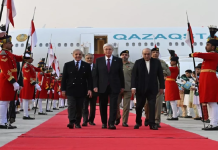ISLAMABAD(London Post)-The head of the European Parliament’s Election Observer Mission (EOM), Michael Garrer, recently issued a statement that sparked critical debate in Islamabad’s political circles. Speaking to a group of Pakistani journalists in the European Parliament, Galler expressed his belief that the fate of Pakistani politics should not be decided by a “third power”. However, he did not specify who this “third force”.
In his speech, Galler also highlighted the challenges faced by EU observers during the 2018 Pakistani elections. He said their visas were issued so slowly that the team was denied access to polling stations. Galler experienced these difficulties first-hand during the 2018 elections, when he was the lead observer for the EU election observer mission. Galler also questioned the EU’s involvement in future Pakistani elections and said he did not know whether election observers would be sent in 2023. Bearing in mind that the EU is primarily focused on recording elections in African and South American countries, which have significantly smaller populations than Pakistan, the decision could be influenced by the capacity of election observers, he said. suggested. Moreover, South Asia’s political dynamics are very different from those of Africa and South America, further complicating matters.
These comments have raised concerns within the PMLN-led government, which plans to dissolve parliament in August 2023. These comments, especially focusing on uncertainty over Gahler’s upcoming parliamentary elections and avoiding “third party” interference, are seen as potentially undermining Pakistan’s democratic process. . The foreign ministry has yet to respond to his statement, which ruling party politicians see as an attempt to sow doubts about democracy and interfere in Pakistan’s internal affairs.
Politicians say Galler’s comments run counter to the EU election observer’s principles of fairness, non-interference and cooperation with the host country. They perceive his remarks to be politically motivated, raising concerns about his ability to comply with diplomatic norms and respect state laws and institutions.
Given the ongoing media scrutiny of Imran Khan’s government by foreign sources, some officials said Gahler’s criticisms were underscored by his reference to a “third party,” the Pakistani military. We believe this is consistent with Mr. Khan’s recent allegations against Supporting Western individuals and organizations raises questions about their motives and goals.
Also concerned about the limited scope of the EU election observer mission, which is primarily focused on monitoring elections in third world countries, and its mandate by democracies such as the US, UK, France and Germany. has been raised. These factors raise questions about mission effectiveness, professionalism, and credibility.
Gahler’s remarks also sparked controversy in journalist circles. Many journalists viewed his statements as biased and insensitive, ignoring the Pakistani government’s perspective and reflecting a lack of moral and diplomatic authority. They argue that his apparent preference for a particular political party demonstrates political bias that undermines the credibility of his esteemed position.
Moreover, Mr Gahler’s criticism of the non-implementation of the recommendations since the 2018 elections overlooks the fact that it was the responsibility of the then ruling government under former Prime Minister Imran Khan to implement these recommendations.
There is The current government, which came to power in April, cannot be held responsible for its failure to implement the EU recommendations. Galler’s remarks were reported by Pakistani media through interviews with six Pakistani journalists in Brussels, but EU officials have not released an official statement on the decision to send election observers.
Undoubtedly, Gahler’s use of terms such as “third power” and references to decision-making in Rawalpindi were controversial and raised questions about upcoming elections and state institutions. Western media may use these statements as a reference and further cast doubt on the credibility of the upcoming Pakistan parliamentary elections.
Furthermore, the statement that Gahler’s organization did not receive any invitations from Pakistan to cover the election reveals a lack of understanding of the country’s system. Since the election date has not yet been announced, the concept of inviting observers and delegations is not currently applicable. Once the election date is fixed, the Pakistan
Electoral Commission usually provides information for accredited registration of foreign journalists on its website and invites foreign delegations. It is important to recognize the European Union’s deep concern for effective democratic institutions around the world that require regular, inclusive, transparent and credible elections.
The EU’s election monitoring missions and advocacy programs are an important part of efforts to promote democracy, human rights and civil society participation around the world. However, EU election observers frequently expressed dissatisfaction with the electoral process in some countries, particularly Central Asia and some white countries. The Organization for Security and Cooperation in Europe’s Office for Democracy and Institutions (OSCE/ODIHR) has repeatedly raised questions about high voter turnout in Central Asian countries, including Tajikistan, Kazakhstan, Uzbekistan and Azerbaijan.
Michael Galler’s recent comments have caused concern in Pakistani politics and sparked debate about the upcoming general elections and the credibility of state institutions. The possible political bias evident in Mr. Galler’s statements and his departure from the principles of the EU election observer mission raise questions about his diplomatic authority and respect for state laws and institutions. It remains to be seen how these remarks will affect perceptions of Pakistan’s upcoming elections, despite ongoing debates in journalism and politics.






